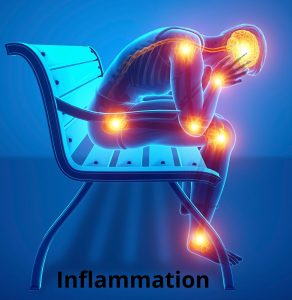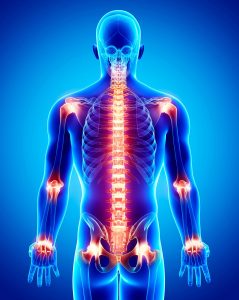Anti-inflammatory
Inflammation
 Inflammation is an essential biological process in our body’s response to harmful stimuli, such as infections, injuries or toxins. It is a natural defense mechanism, initiated by the immune system to fight pathogens and facilitate healing. Here is a more detailed explanation:
Inflammation is an essential biological process in our body’s response to harmful stimuli, such as infections, injuries or toxins. It is a natural defense mechanism, initiated by the immune system to fight pathogens and facilitate healing. Here is a more detailed explanation:
1. What is inflammation?
• It manifests as a protective reaction involving immune cells, blood vessels and molecular mediators. This response aims to eliminate the triggers of cell injury, remove dead cell debris and damaged tissue, and initiate tissue repair and healing.
2. Why does inflammation occur?
• Inflammation occurs in response to tissue damage caused by physical factors (such as a cut or burn), bacterial or viral infections, allergic reactions, or chronic conditions. It represents an integral part of the healing process, allowing the body to defend itself and recover.
3. What types of inflammation can occur?
• There are two main types of inflammation: acute and chronic.
• Acute inflammation: It is rapid and usually short-lived, characterized by signs such as redness, warmth, swelling, pain and sometimes loss of function. It is an immediate and intense reaction to an injury or infection.
• Chronic inflammation: If inflammation persists over a long period of time, it becomes chronic. This type of inflammation is often less noticeable but can play a role in the development of various chronic diseases, such as heart disease, diabetes, and arthritis.
Managing inflammation, whether acute or chronic, is crucial. It may involve medical interventions, lifestyle changes and the use of natural remedies to support the healing process and reduce the risk of long-term complications.
Natural Anti-Inflammatories
 Natural remedies offer an alternative or complement to conventional medications, often with fewer side effects.
Natural remedies offer an alternative or complement to conventional medications, often with fewer side effects.
Among the most recognized, we find:
Ginger and Green Tea: Known for their antioxidant, digestive and anti-inflammatory properties.
Curcumin: Found in turmeric, it is renowned for its powerful anti-inflammatory properties, and is often used in the form of capsules or tinctures for better assimilation.
Bromelain and Serrapeptase: Enzymes that help reduce inflammation and pain.
Devil’s Claw (Harpagophytum): A traditional herb known for its beneficial effects on joint pain and inflammation.
Integration into the Daily Routine
• Eating a diet rich in anti-inflammatory compounds, engaging in regular physical activity, and avoiding dietary and environmental toxins are complementary measures to manage inflammation.
• It is also recommended to consult a healthcare professional before incorporating anti-inflammatories, especially if you are already taking other medications or if you have specific medical conditions.
In short, anti-inflammatories, whether natural or medicinal, play a key role in the management of inflammation. Informed and responsible use, combined with a healthy lifestyle, can greatly contribute to the prevention and treatment of inflammatory disorders.
Showing 33–47 of 47 results
Showing 33–47 of 47 results





















